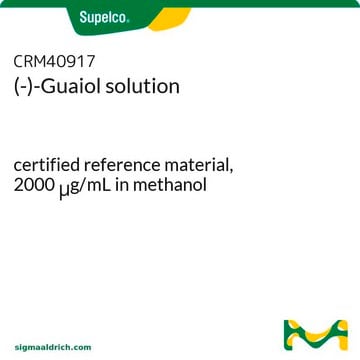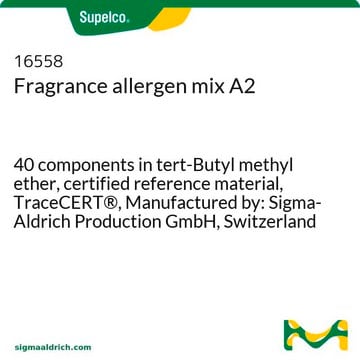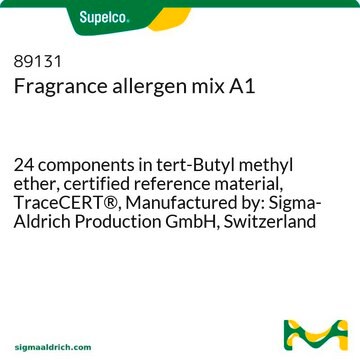91034
(−)-Caryophyllene oxide
analytical standard
Synonyme(s) :
β-Caryophyllene epoxide, (−)-Epoxycaryophyllene, (−)-Epoxydihydrocaryophyllene, (1R,4R,6R,10S)-9-Methylene-4,12,12-trimethyl-5-oxatricyclo[8.2.0.04,6]dodecane, trans-Caryophyllene oxide
About This Item
Produits recommandés
Qualité
analytical standard
Niveau de qualité
Pureté
≥98.5% (GC)
Activité optique
[α]/D -71.0±1°, c = 2 in chloroform
Durée de conservation
limited shelf life, expiry date on the label
Technique(s)
HPLC: suitable
gas chromatography (GC): suitable
Pf
62-63 °C (lit.)
Application(s)
cleaning products
cosmetics
flavors and fragrances
food and beverages
personal care
Format
neat
Température de stockage
2-8°C
Chaîne SMILES
[H][C@@]12CCC(=C)[C@@]3([H])CC(C)(C)[C@]3([H])CC[C@@]1(C)O2
InChI
1S/C15H24O/c1-10-5-6-13-15(4,16-13)8-7-12-11(10)9-14(12,2)3/h11-13H,1,5-9H2,2-4H3/t11-,12-,13-,15-/m1/s1
Clé InChI
NVEQFIOZRFFVFW-RGCMKSIDSA-N
Vous recherchez des produits similaires ? Visite Guide de comparaison des produits
Catégories apparentées
Description générale
Application
Mention d'avertissement
Warning
Mentions de danger
Conseils de prudence
Classification des risques
Aquatic Chronic 2 - Eye Irrit. 2 - Skin Irrit. 2
Code de la classe de stockage
11 - Combustible Solids
Classe de danger pour l'eau (WGK)
WGK 2
Point d'éclair (°F)
230.0 °F - closed cup
Point d'éclair (°C)
110 °C - closed cup
Faites votre choix parmi les versions les plus récentes :
Déjà en possession de ce produit ?
Retrouvez la documentation relative aux produits que vous avez récemment achetés dans la Bibliothèque de documents.
Les clients ont également consulté
Notre équipe de scientifiques dispose d'une expérience dans tous les secteurs de la recherche, notamment en sciences de la vie, science des matériaux, synthèse chimique, chromatographie, analyse et dans de nombreux autres domaines..
Contacter notre Service technique











